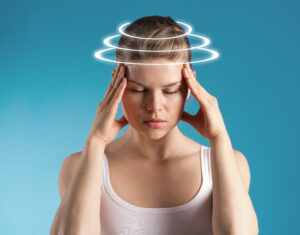Article
Balance Disorder, Dizziness, Vertigo, Vestibular
September is Balance Awareness Month. What is a balance disorder? It’s a condition that makes you feel unsteady or dizzy. You can feel like you are moving even when you are standing still or laying down and can be very unsettling.
 The symptoms of a balance disorder can include the following:
The symptoms of a balance disorder can include the following:
- Dizziness | Spinning Sensation
- Loss of balance or feeling like you are about to fall
- Uneven walking
- Faintness and/or lightheadedness
- Floating sensation
- Blurred vision
- Disorientation
- Hearing loss
How often, how long, and to what severity these symptoms are occurring is pertinent information that should be given to health care professionals. Properly defining what subset of dizziness, as well as any other corresponding symptoms the patient is experiencing, will best allow practitioners to direct appropriate care. These symptoms can come and go and in some cases last for a significant amount of time which may cause a patient to become depressed and experience extreme fatigue.
Types of balance disorders:
Vertigo is clinically defined as the patient feeling as though the environment is rotating, or as though they are rotating within the environment. This is the only time the word vertigo should be used. The most common type of vertigo for which patients seek treatment is BPPV (Benign Paroxysmal Positional Vertigo). BPPV is caused by otoconia (or “ear rocks/crystals”) that become displaced and move into the wrong portion of the inner ear. BPPV is easily treatable utilizing canalith repositioning maneuvers. Proper physical therapy assessment is often the most successful way to treat BPPV because physical therapists can accurately diagnose the location of the displaced crystals and typically can resolve the vertigo symptoms within the first visit.
Labyrinthitis: is defined as an infection or inflammation of the inner ear which can disrupt balance and is typically the result of an upper respiratory infection.
Ménière’s Disease: is typically found in adults between the ages of 40 – 60 and is a disorder caused by the build up of fluid in the inner ear (labyrinth). It typically effects one ear with a feeling for fullness or congestion which causes severe dizziness, ringing in the ears (tinnitus), and hearing loss.
Treatments
HARTZ Physical Therapy has a few PT’s on staff who specialize in Vestibular Therapy and they are happy to assess all patients that are experiencing dizziness. In the video below Kevin Sisbarro from our Lititz office explains how PT can help and what an exam for a balance disorder will look like. Please remember that many insurance plans allow you to be seen as a Direct Access patient and therefore, do not require a physician’s referral prior to beginning physical therapy which will help you get on the road to recovery much quicker.

